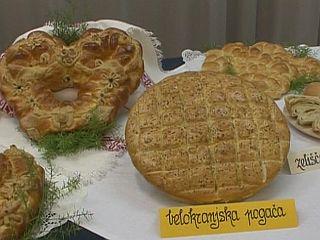
Slovenia’s southern province of Bela Krajina is known as a land of sun-drenched vineyards and birch forests. It is also the home of a local delicacy whose origins date back to migrations from the Western Balkans.
The dish is known as "Belokranjska pogača" and is essentially a type of flatbread topped with a layer of caraway, eggs, and sea salt. "Pogača" is crisscrossed with grooves and, according to tradition, it must be broken off in pieces - never sliced. Unlike most bread, it is customarily eaten warm, straight from the oven.
Even though "pogača" is now closely associated with Bela Krajina, it came to the region with migrations that happened many centuries ago. As residents of modern-day Bosnia and Serbia fled the advancing Ottoman armies in the late Middle Ages, many refugees – known as Uskoks – found refuge in Bela Krajina. They introduced new clothing styles, music, and cuisine to the region. Among their imports was the traditional bread that later became known as "pogača".
Over the centuries, the baking of "pogača" was preserved as a tradition throughout Bela Krajina, and the recipe remained essentially unchanged from generation to generation.
When Slovenia became a member of the EU, locals decided to have the tradition recipe protected on the European level. They efforts were successful, and "Belokranjska pogača" is now officially recognized as a dish with a protected origin, meaning that it can only be made in Bela Krajina - and that everyone who markets it must keep true to the centuries-old recipe. So far, several local bakers have obtained a special certificates acknowledging them as makers of authentic local "pogača".
Today, more and more Slovenians are rediscovering this traditional delicacy, which also serves as a reminder of Bela Krajina’s unique and always interesting history.

































































